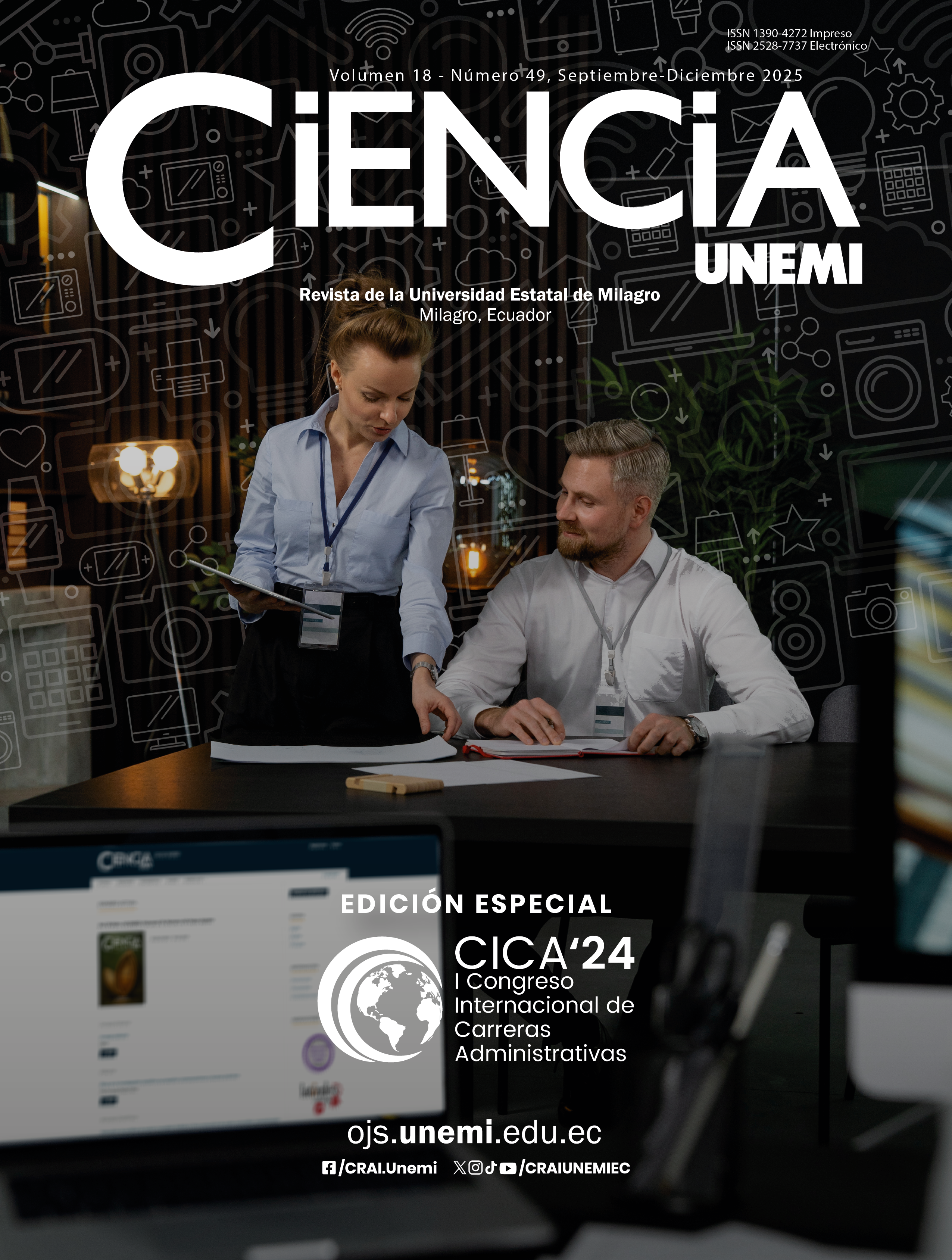Integration of artificial intelligence in educational management strategies
Keywords:
Artificial intelligence, strategies, educational management, integrated development, leadershipAbstract
The integration of artificial intelligence (AI) into decision-making not only sets the foundation for the development of new management strategies, but also reflects ongoing technological progress. This study aimed to evaluate perceptions regarding the integration of AI in educational management tasks for complex decision-making, contributing to the enhancement of strategic leadership. The research proposes an adaptive and personalized pedagogical approach through advanced technologies in educational environments, in response to the growing need for methodologies aligned with the digital era. To identify AI-based integrated development strategies (IDS), an exploratory and descriptive approach was adopted. Experts participated in the validation process using Aiken's V coefficient to ensure the relevance, pertinence, and clarity of the instrument items. The results reveal that the implementation of AI tools in educational management significantly improves leadership and management skills. Most participants reported increased interest and proactivity in their learning processes. This study contributes to the expanding body of knowledge on AI in education by offering significant findings for educators. The implications suggest a promising path for the digital transformation of higher education, emphasizing the importance of personalization and adaptability in teaching and learning processes
Downloads
References
Acosta Camino, D. F., & Andrade Clavijo, B. P. . (2024). La Inteligencia artificial en la investigación y redacción de textos académicos. Espíritu Emprendedor TES, 8(1), 19–34. https://doi.org/10.33970/eetes.v8.n1.2024.369
Bedia, M. G., & Carrasco, J. G. (2006). Arquitecturas emocionales en inteligencia artificial: una propuesta unificadora. Education in the knowledge society (EKS). https://n9.cl/ba9mb
Castrillón, O. D., Sarache, W., & Ruiz-Herrera, S. (2020). Predicción del rendimiento académico por medio de técnicas de inteligencia artificial. Formación universitaria. https://dialnet.unirioja.es/servlet/articulo?codigo=8098969
Delgado-Reyes, A. C., Parra, T. L. O., & López, J. V. S. (2020). Realidad virtual: evaluación e intervención en el trastorno del espectro autista. Revista electrónica de psicología Iztacala. https://doi.org/10.21556/edutec.2023.84.2769
González Bedia, M., & García Carrasco, J. (2018). Arquitecturas emocionales en inteligencia artificial: una propuesta unificadora. Education in the Knowledge Society (EKS), 7(2). https://doi.org/10.14201/eks.19417
Guevara, G., Verdesoto, A., y Castro, N. (2020). Metodologías de investigación educativa (descriptivas, experimentales, participativas, y de investigación-acción). https://doi.org/10.26820/recimundo/4.(3).julio.2020.163-173
Gutiérrez, L. V. V. (2019). Gestión educativa y su relación con el desempeño docente. Ciencia y Educación. https://doi.org/10.48169/Ecuatesis/0102202008
López, K. M. G. (2023). Inteligencia artificial generativa: Irrupción y desafíos. https://n9.cl/6ru7s.
López, J. M. T., Ruiz, M. J. U., & Mazza, B. (2022). Aplicación de la inteligencia artificial en comunicación. Revista Latina de Comunicación Social. https://dialnet.unirioja.es/servlet/articulo?codigo=8371440
Lule-Uriarte, María Nilda, Serrano-Mesía, Max Michael, & Montenegro-Cruz, Nilson Yover. (2023). La gestión educativa: factor clave en la calidad educacional. Revista Científica UISRAEL, 10(3), 57-71. Epub 10 de diciembre de 2023. https://doi.org/10.35290/rcui.v10n3.2023.893
Reyes, E. (2022). Metodología de la Investigación Científica. En E. Reyes, Metodología de la Investigación Científica. Page Publishing.
Riffo, R. (2019). Gestión administrativa y de calidad en los centros escolares de los Chorrillos. Revista Scientific, 4, 153-172. https://doi.org/10.29394/Scientific.issn.2542-2987.2019.4.E.9.153-172
Rosales-Veítia, J., & Marcano-Montilla, A. (2022). Mapas comunitarios de riesgos, conceptualización y abordaje metodológico. Algunas consideraciones. IPSA Scientia, Revista Científica Multidisciplinaria, 7(1), 38–57. https://doi.org/10.25214/27114406.1391
Rouhiainen, L. (2018). Inteligencia artificial. https://n9.cl/mw0e9m
Telefónica, F. (2011). Realidad Aumentada: una nueva lente para ver el mundo. Fundación Telefónica. https://publicaciones.fundaciontelefonica.com/api/view/publication/realidad-aumentada-una-nueva-lente-para-ver-el-mundo/143?country=null
Turing, A.M. (1950), “Computing intelligence and machinery” from Mind LIX, Nº 2236,pp. 433-60. Reprinted in M.A. Boden (ed.), The Philosophy of ArtificialIntelligence. Oxford: Oxford University Press, pp. 40-66
Woodruff, K., Hutson, J., & Arnone, K. (7 de agosto de 2023). Perceptions and Barriers to Adopting Artificial Intelligence in K-12 Education: A Survey of Educators in Fifty States. Revistas IntechOpen. http://dx.doi.org/10.5772/intechopen.1002741
Zhang, K., & Begum, A. (2021). AI technologies for education: Recent research & future directions. Computadoras y Educación: Inteligencia Artificial, II. https://doi.org/10.1016/j.caeai.2021.100025
Downloads
Published
Issue
Section
License
Copyright (c) 2025 CIENCIA UNEMI

This work is licensed under a Creative Commons Attribution-NonCommercial-NoDerivatives 4.0 International License.
Authors can keep the copyright, granting the journal right of first publication. Alternatively, authors can transfer copyright to the journal, which allow authors non-commercial use of the work, including the right to place it in a file open access.
















